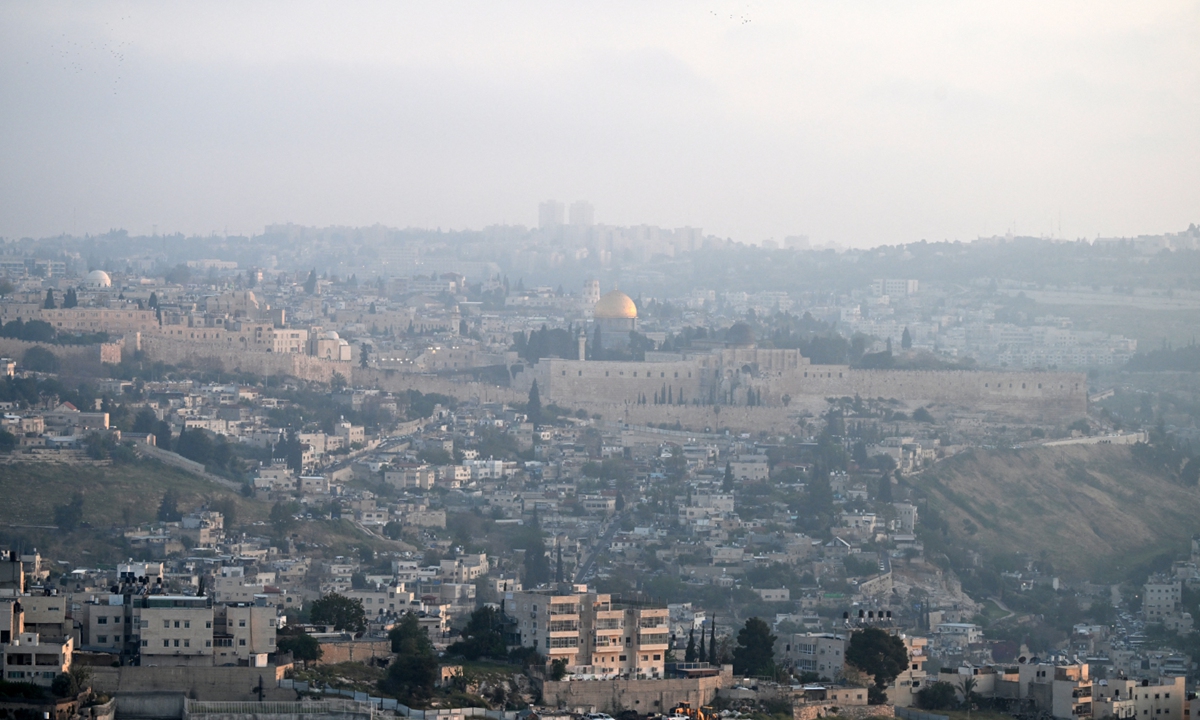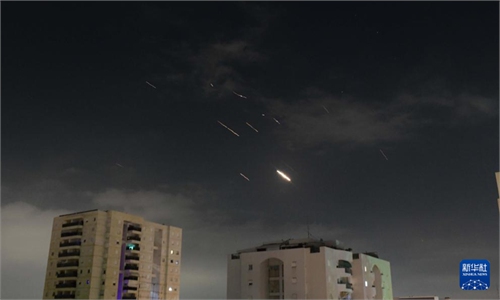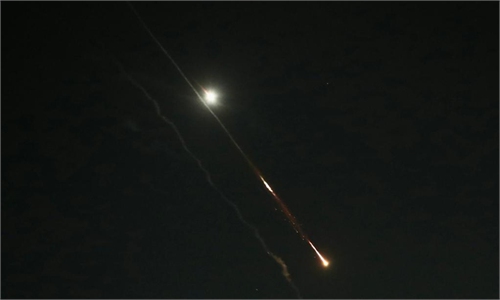China calls on relevant parties to exercise calm and restraint as Iran launched military strike against Israel

A panoramic view of Jerusalem's Old City is pictured at dawn on April 14, 2024, after Iran launched a drone and missile attack on Israel in retaliation for the Israeli airstrike on the consular section of the Iranian embassy in Damascus, Syria on April 1, 2024. Photo: AFP
China on Sunday expressed deep concerns over the current escalation and called on relevant parties to exercise calm and restraint to prevent further escalations after Iran launched military strike against Israeli territory. Chinese experts believe Iran's retaliatory attack in response to Israel's bombing of the Iranian embassy in Syria is "restrained." However, in order for tensions to de-escalate, it is imperative that Israel refrains from taking further provocative actions that could exacerbate the situation and lead to more damage for Iran.
If Israel launches retaliation, it could escalate tensions and potentially draw the US into another Middle East crisis, a situation the US is trying to avoid, said Chinese experts, who believe that Israel's targeting of Iran may be a strategic move to involve the US in the conflict, in order to secure more support from Washington as its backing appears to be diminishing.
Iran reportedly launched over 200 drones and missiles at Israel on Saturday night, after Teheran vowed earlier retaliation for an Israeli strike on its Damascus consulate on April 1 that killed seven Revolutionary Guards officers including two senior commanders, Reuters reported.
In remarks on Sunday morning, Chief of Staff of the Iranian Armed Forces Major General Mohammad Hossein Baqeri said the punitive mission "Operation True Promise" in retaliation for the Israeli airstrike on the consular section of the Iranian embassy in Damascus has ended, Iran's Tasnim News Agency reported.
"A considerable number of drones and cruise and ballistic missiles have been used in this operation with well-thought-out tactics and proper planning, as neither the Iron Dome nor the Zionist regime's missile defense shield could take any significant action against this operation. The operation's purposes have been fulfilled," the top commander said.
Israel Defense Forces (IDF) spokesman Rear Admiral Daniel Hagari said some Iranian missiles had hit inside Israel, causing minor damage to a military base. Hagari said "a girl was severely injured" from shrapnel, however, there have been no other casualties.
But the Iranian commander Baqeri stated that Iran's military operation targeted "the major Israeli intelligence centers in the Jabal al-Sheikh heights at the border between Syria and the occupied Palestinian territories that provided the intelligence for the Israeli airstrike on Iran's diplomatic mission in Damascus on April 1" and also targeted Israel's Nevatim airbase from which the F-35 fighter jets had taken off to hit the Iranian diplomatic mission in Syria. "Their (Israeli) population and economic centers were not hit," Baqeri said.
After the attack, Israeli Prime Minister Benjamin Netanyahu on Sunday said his country had been preparing for a direct attack by Iran for years and is ready to respond. "Israel has been preparing for a direct attack by Iran. Our defensive systems are deployed; we are ready for any scenario, both defensively and offensively. We have demanded a clear principle: Whoever harms us, we will harm them."
The UN Security Council is scheduled convene later on Sunday for an emergency meeting over Iran's attack on Israel, its current president Vanessa Frazier said.
The ongoing situation is the latest spillover of the Gaza conflict, a spokesperson of China's Foreign Ministry said on Sunday, adding that there should be no more delays in implementing UN Security Council Resolution 2728 and the conflict must end now,
China has also called on the international community, especially countries with influence, to play a constructive role for the peace and stability of the region, said the spokesperson.
A Chinese national living in Jerusalem told the Global Times that around 3 am local time on Sunday they heard the sound of air raid sirens and explosions, but it has now calmed down. "We were open for business as usual yesterday, and we have not received any notice today."
The Chinese Embassy in Iran issued a special reminder to Chinese nationals in Iran on Sunday to closely monitor the local security situation, as tensions in the Middle East have further intensified.
Potential escalation
Iran's mission to the UN said that following the launch of the drones toward Israel, Tehran now considered that its retaliation for an attack on its diplomatic compound in Damascus to be ended, the Wall Street Journal reported.
Wei Dongxu, a Chinese military expert, told the Global Times on Sunday that Iran's retaliation is primarily in response to the calls of its own people, while also demonstrating strength and determination in the current turbulent regional situation. However, Iran does not wish to be drawn into a large-scale conflict or war.
Iran has acted with restraint as its attack has caused no death in Israel and the damage is limited, whether the situation will further escalate largely depends on response from Israel, the biggest uncertainty in the Middle East right now, Zhu Yongbiao, executive director of the Research Center for the Belt and Road at Lanzhou University, told the Global Times on Sunday.
Zhu believes that if military conflict between Iran and Israel escalates, the likelihood of US' intervention will increase despite Washington's reluctance of being dragged in.
Another Chinese military expert who requested anonymity said Iran would assess the possibility of launching multiple waves of attack, with the most important factor being to observe the reactions of the US and Israel. If the US and Israel respond with counterattacks, Iran might launch a second and third round of attacks, potentially escalating the conflict further, the expert said.
Biden on Saturday condemned the Iranian attacks, and pledged a coordinated G7 diplomatic response. The US president said he reiterated the ironclad US support for Israel's security in a call with Prime Minister Benjamin Netanyahu, according to Reuters.
Biden told Netanyahu during a call on Saturday that the US won't support any Israeli counterattack against Iran, a senior White House official told Axios.
The current Biden administration's support for Israel has waned recently, and Israel is trying to tie the Biden administration down, hoping to regain its strong support. However, the US attitude is somewhat ambiguous. If Iran and Israel engage in large-scale warfare, the US will be drawn into it, which is "something the US does not wish to see," the expert added.
US' reluctance
The US would respond differently depending on the development of the battlefield situation, another expert on US affairs who preferred not to be named told the Global Times on Sunday.
"Israel can strike opponents in the Middle East with impunity because it has the support of the US. Currently, the US policy toward Israel does not offer much flexibility, being led by the nose by Israel, with little room for compromise. Once Israel suffers a major military setback, the US will have no choice but to intensely intervene in the war," the expert said.
However, the US is currently working hard to avoid this scenario, said Zhu, noting that the US does not want to see an escalation and loss of control in the military conflict between Iran and Israel.
"From a global strategic perspective, the US does not want to commit too many resources to the Middle East, as this would affect US' aid to Ukraine in the Russia-Ukraine conflict, as well as its strategic planning in the Asia-Pacific region," the anonymous US expert said.
Before Iran's attack, the US asked China and other countries, including Turkey and Saudi Arabia, to urge Tehran not to launch a retaliatory attack on Israel, the Financial Times reported.
The Financial Times report also claimed that the Biden administration has repeatedly asked China in recent months to use its leverage with Tehran, but US officials said they haven't seen evidence that China has done anything to apply pressure.
"This is the US and other Western countries' low-cost trick trying to pressure China, as Washington is trying to gradually pull out of the Middle East crisis, and believes China has certain influence over Iran," said Zhu.
If the US is sincere about pacifying the situation in the Middle East, it should meet China half way on the UN level so to generate more forceful resolution for countries involved in the crisis to reach cease-fire and calm down; instead of offering one-sided support for its ally Israel, Zhu noted.


